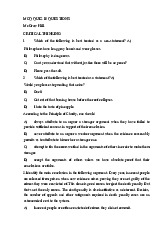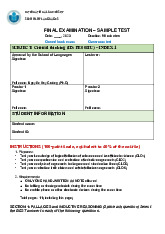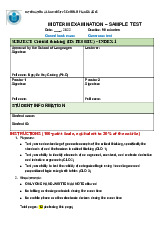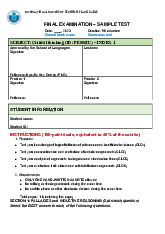













Preview text:
lOMoARcPSD|359 747 69
INTERNATIONAL UNIVERSITY – VNU HCMC Chapter 8 EVALUATING ARGUMENT
“Our very eyes are sometimes, like our judgments, blind” - Shakespeare lOMoARcPSD|359 747 69 Evaluating Arguments
What “good argument” does not mean?
• argument whose conclusion I agree with • persuasive argument
• Well-written or well-spoken argument What is a GOOD ARGUMENT? • All premises are true,
• Premises provide good reasons to accept the conclusion. lOMoARcPSD|359 747 69 Evaluating Arguments What is a good argument?
A good argument is an argument that is either deductively sound or inductively cogent
• deductively valid: the conclusion must be true if the premises are true.
• Both deductively valid and have all true premises are said to be deductively sound.
• inductively strong: the conclusion is probably true if the premises are true. lOMoARcPSD|359 747 69
• Both inductively sound and have all true premises are said to be inductively cogent. Evaluating Arguments
General Guidelines(Key questions): Are the premises true?
Is the argument deductively validor inductively strong? Is the reasoning correct?
Does the arguer commit any logical fallacies?
Does the arguer express his or her points clearlyand precisely?
Are the premises relevantto the conclusion? lOMoARcPSD|359 747 69 Evaluating Arguments
General Guidelines(Key questions):
Is the claim logically consistent? Do any claims
contradictother claims made in the argument?
Is the argument complete? Is all relevant evidence taken
into account (given understandable limitations of time, space, context and so on)?
Is the argument fair? Is the arguer fair in his or her
presentation of the evidence and treatment of opposing arguments and views? Evaluating Arguments
When is it reasonable to accept a premise? lOMoARcPSD|359 747 69 Women are smarter than Men! Under what Men gossip more than Women!
conditions is it reasonable to
Women are better leaders than Men! accept such Men are more creative than Women! claims?
In general, it is reasonable to accept an unsupported claimas truewhen:
• The claim does not conflict with PERSONAL EXPERIENCE • The
claim does not conflict with BACKGROUND BELIEFS
• The claim comes from a CREDIBLE SOURCE.
1. Does the Claim Conflict with our Personal Experiences?
• People often place too muchtrust in their own observation and experiences. lOMoARcPSD|359 747 69
• Personal experiences are often less reliable than we think. We need to be
aware that “believing” is often “seeing” and that things are not always as they appear.
Critical thinkers recognize that their beliefs, hopes, fears, expectations, and
biases can affect their observations.
2. Does the Claim Conflict with our Background Beliefs? lOMoARcPSD|359 747 69
• Background beliefs–A vast network of conscious and
unconscious convictions we use as a framework to assess the
credibility of claims that can’t be verified directly.
• “It was raining in Kuala Lumpur last 31st August.”
Critical thinkers think very carefully about the beliefs they accept.
Never believe without sufficient evidence and never believe more strongly than the
evidence warrants. – Watchwords of the wise.
3. Does the Claim Come from a Credible Source?
Is the source a genuine expert or authority?
Does the source speak in his or her area of expertise?
Is the source biased or has some other motive to lie or mislead? lOMoARcPSD|359 747 69
Is the accuracy of the source’s personal observations or experiences questionable?
Is the source contained in a source that is generally unreliable (e.g. gossip magazine) ?
Has the source been cited correctly or has been quoted out of context?
Is the issue one that can be settled by expert opinion?
Is the claim made by the source highly improbable on its face?
Critical thinkers must ask, “Are all premises true?” and “Do the premises provide good
reasons to accept the conclusion?” Exercise
Indicate whether or not it would be reasonable to accept the claim? What criteria?
• Black cats bring bad luck. lOMoARcPSD|359 747 69
• I read the entire Encyclopedia Britannica last summer (said by a stranger at a party).
• There is no hard scientific evidence that smoking is addictive(said by a tobacco company executive). • Ghosts really exist.
• Aliens have visited the earth in some form. Refuting arguments
• To refute an argument is to defeat it – to show that
the premises do not provide good reasons to accept the conclusion.
• There are two ways to refute an argument:
• (1) Show that a premise or a critical group of premises is false or dubious lOMoARcPSD|359 747 69
• (2) show that the reasoning is bad - that the premises do
not provide adequate logical support for the conclusion. Showing Premises False
• Showing a premise to be false is sufficient to refute the argument.
Ex: (1) All presidents live in the White House. (2) Paris
Hilton is President. So, (3) Paris Hilton lives in the White House.
• False irrelevant premise will not refute the argument. Ex:
(1) All circles are squares. (2) All squares are rectangles. lOMoARcPSD|359 747 69
(3) All rectangles are geometrical figures. (4) So, all
squares are geometrical figures.
Showing Premises to be Dubious • Demonstrating doubt:
• Appeal to personal experience, common knowledge, or reputable source.
• Note a self-contradiction (either in a single premise or between premises).
• Show the premises is based on an unwarranted assumption.
• Other refutation Techniques:
• Reducing to the absurd: Show the truth of a premise would entail
something clearly false (absurd). lOMoARcPSD|359 747 69
• Present a counter-example: present an exception that shows a premise false.
• (arguer): All 20th Century presidents were rich.
• (you): Harry Truman wasn’t!
Showing That the Conclusion does Not Follow from the Premises.
• Show that the argument is either (a) deductively invalid or (b) inductively weak. • Most important questions:
• If deductive, does the conclusion follow necessarily from the premises?
• Are the premises relevant (is there a fallacy)? lOMoARcPSD|359 747 69
• Are the premises sufficient to support the conclusion?
Document Outline
- EVALUATING ARGUMENT
- Evaluating Arguments
- Evaluating Arguments (1)
- Evaluating Arguments (2)
- Evaluating Arguments
- Exercise
- Refuting arguments
- Showing Premises False
- Showing Premises to be Dubious




